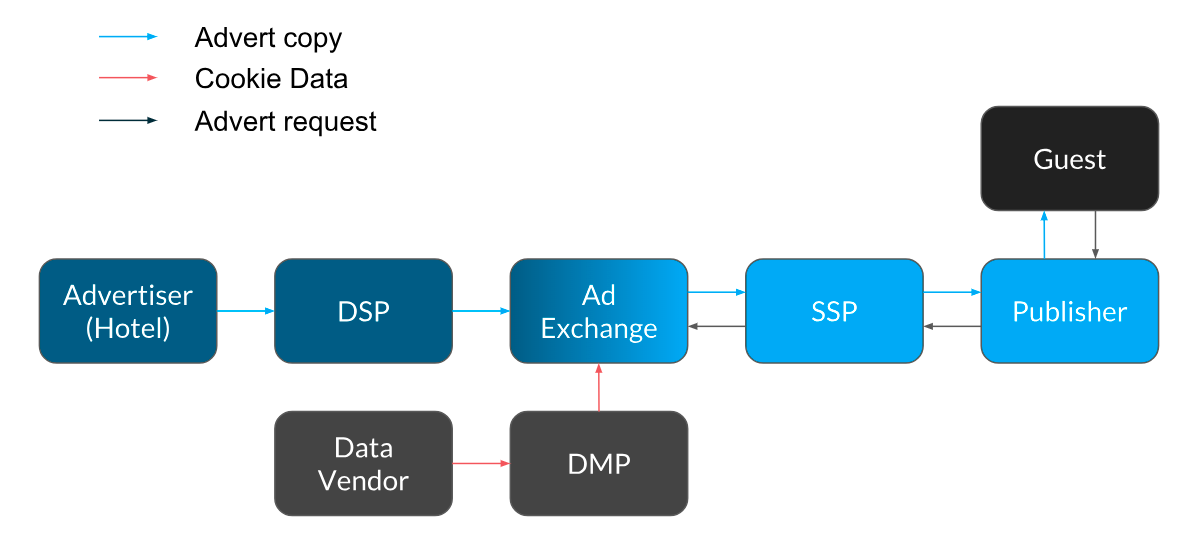
What is Programmatic Marketing?
Programmatic marketing is, in a phrase, the automated buying of web advertising space.
This can be done in two ways:
Real Time Bidding (RTB) – Bidding is undertaken by AIs (artificial intelligence) acting on pre-assigned targeting and algorithms rather than having human media buyers. This means that the bidding is done on an impression by impression basis and that the CPI (cost per impression) is therefore influenced by the perceived quality of the cookie profile of the viewer, webpage and other factors. A cookie profile is an analysis of the persistent data that is stored in your browser. This profile will be made up from the sites that you visit, the actions that you take and other web activities.
Programmatic Direct – This is a more efficient way to access advertising space and buy it directly, it allows you to browse inventory in a much more transparent way and select websites you may not have considered advertising through.
I will be focussing on RTB in this post.
In a nutshell, the process works something like this:
- Joe Bloggs is browsing the web.
- As Joe is browsing his favourite news website an advert loads in a banner on the side from a relevant brand.
- In the time between Joe clicking on “Top 5 space hopper designs for 2019” and the page displaying on his laptop an entire auction took place.
- A number of AIs were bidding on that ad space using targeting algorithms that tell them Joe is a valuable impression for them to have based on his cookie profile.
- Once the auction has finished (taking a split second) the graphics for the winning advert is shown in the advertising space on the space hopper article. This will be charged at a price that is just above the price of the second place bidder.
How does it work?
There are a number of key platforms that operate together in order to facilitate this process:

- Demand Side Platform – DSP
- This is the AI bidder
- We would place adverts through one of these for our clients
- Supply Side Platform – SSP
- This is the AI seller
- A publishers space would go live on this when the page is loaded
- Ad Exchange
- This is the auction house
- It sits between the DSP and the SSP
- DMP
- Data management platform (this is the confusing part)
- This is where the DSP (Bidder) will draw cookie data from to make a decision on the bid value and whether the impression would be worth making.
- The DMP will use 1st party data (from the advertiser), 2nd party data (from the agency) and 3rd party data (bought externally) and store it to be used by the DSP at any time.
- Using AI to analyse this data means that patterns between target segments can be easily detected to create recommendations for future groups to target.
How would it help Hotels?
There are three main benefits that your Hotel will gain from use of Programmatic campaigns:
- The inventory of advertising space you have potential access to is much greater than through traditional channels
- The level of targeting you can undertake can be based on cross-site journeys
- Your database size will make the process easier
- It allows for you to run display campaigns across a large number of websites to try and attract a certain target audience. This is instead of running one campaign of 1000 impressions on a website that is un-scientifically thought to attract the right sort of audience.
- The key difference here is the ability to target an individual persona rather than a fixed advert location. This should improve the quality of impressions and therefore drive up your KPIs as the less relevant viewers are filtered out. It would also allow you to expand the understanding of the habits of your target groups, as well as allowing you to target new groups.
- Hotels have a much larger first party data set than a large amount of industries. This allows for much more efficient target modelling and also for copy within these adverts to be more heavily personalised towards previous or potential clients.
Are there any drawbacks?
- Brand Safety
One issue that was widespread in mid 2017 was adverts for major brands appearing alongside content they would not want to be associated with.
This can be solved by blacklisting certain search terms. I.e. if there is a tragic molasses flood that the business doesn’t want to be associated with then the adverts can be prevented from appearing next to any articles with sensitive keywords.
- Ad Fraud
If a bot is loading a page then the impression is obviously entirely wasted. This could end up costing a business hugely for valueless impressions.
As the technology is AI it has the ability to learn which leads appear to be lower quality and to filter them out of their bidding process.
- Viewability
Whereas in direct digital buying you will be able to say, “I want a banner ad for my fruit company at the top of your article on why fruit is healthy.” with programmatic the ads are bought automatically so this will have to be added into the decision making of the program.
Where can I find out more?
Give us a call on: 0203 6425898
Or send us an email at sales@umidigital.com





